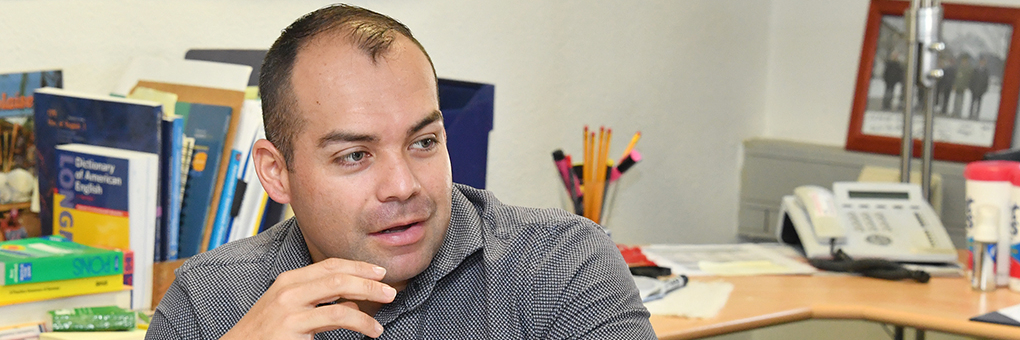
Marshall Center Course Strengthens Language Skills to Fight Organized Crime
By Christine June
Public Affairs Office
George C. Marshall European Center for Security Studies
GARMISCH-PARTENKIRCHEN, Germany (May 9, 2017) – Dr. Ion Nastas, who is tasked with preventing and combating corruption in his country, has an answer for those who ask him why he needs to speak English since he works in the Republic of Moldova and speaks Romanian.
“In today’s world, day after day, I have more cases where I need to speak English because I often have to call my colleagues from different countries and ask them for help,” said Nastas, who is the head of Strategic Analysis Division of the Center for Combating Economic Crimes and Corruption in the Republic of Moldova. “Also, I have projects where most of the documents I need are in English.”
Nastas and his16 classmates from 12 nations graduated from the English Language Enhancement Course May 9 at the George C. Marshall European Center for Security Studies.
English as a Weapon against Transnational Organized Crime
The Marshall Center’s Partner Language Training Center Europe developed this five-week course to increase participants’ confidence and ability to communicate in English at a professional level on security topics. It’s for participants who will be attending Marshall Center resident programs that use specific course terminology and encourage discussions among classmates from varied backgrounds and cultures.
These new graduates will be attending the Marshall Center’s Program on Countering Transnational Organized Crime, a two-week course that focuses on 21st century national security threats from criminal and terrorist organizations.
Normally, ELEC graduates start CTOC the day after graduation, but this iteration has been rescheduled for Aug. 7 to 25, as a result of the U.S. government budgetary process. These participants will head back home and return to attend CTOC as their schedules permit.
“You have all earned a seat in the CTOC course,” U.S. Army Col. Robert Peters, CTOC deputy director, assured them during the graduation ceremony.
“Language is a limitless opportunity and a key that can unlock the future for you,” said Peters, who also speaks another language. “You have begun the work of building professional networks that are regional, international and transnational.
“We have a saying in CTOC – ‘it takes a network to defeat a network.’”
‘Fill Up the Tree’
Through reading materials, presentations by guest speakers, classroom discussions, and videos, participants become familiar with the terminology used in CTOC, while improving their understanding of the nature of security threats imposed by transnational organized crime organizations.
“What really guides us through the whole course is what will CTOC demand of them and how can they incorporate what they learn here in their professional life or future career,” said Nancy Margalit, an ELEC instructor.
The other ELEC instructor, Thomas Soule, said that ELEC facilitates discussions to where the classmates are teaching each other.
“We had such a diverse mix of people who were in different fields and agencies, and combatting different aspects of TOC,” Soule said. “I think one of the nice things about our course is that we fill up the tree as far as vocabulary because they learn from each other and have a broader knowledge of the lingo for CTOC.”
For Colombian army Maj. Armando Duran Salazar, it was not just learning the words but also the fine distinctions of CTOC terms.
“I now know the differences between ‘human trafficking,’ ‘trafficking in persons,’ ‘slavery’ and ‘sexual exploitation,” said Duran, who works in the Colombian Army Special Forces Division.
Citizens of the World
Nastas said they were not attending ELEC to learn English.
“I spoke English every day, but, it was general English,” Nastas said. “Now, I can speak English using more technical terms and in a professional way so that I am able to communicate with my colleagues from other countries.”
He said this will help him in his daily work.
“This is very important because corruption is now one of the biggest challenges for Moldova,” Nastas said. “It’s a real threat to our security and prosperity.”
As Duran pointed out, “English is the universal language.”
Professor Carlos Manuel Capurro Fernández, from the Instituto de Altos Estudios Estrategicos in Paraguay, spoke for his class at the graduation ceremony.
“Five weeks – we had the opportunity to improve our professional skills in English. Five weeks – we expanded our knowledge on the issues related to transnational organized crime, especially during the interesting debates generated in class. Five weeks – we were able to analyse and share different points of view from various perspectives. Five weeks – everyone – absolutely everyone – grew more as a person because we learned about each other’s cultures.
“Today, we are more than citizens of our countries or continents,” Capurro said. “We are now citizens of the world.”